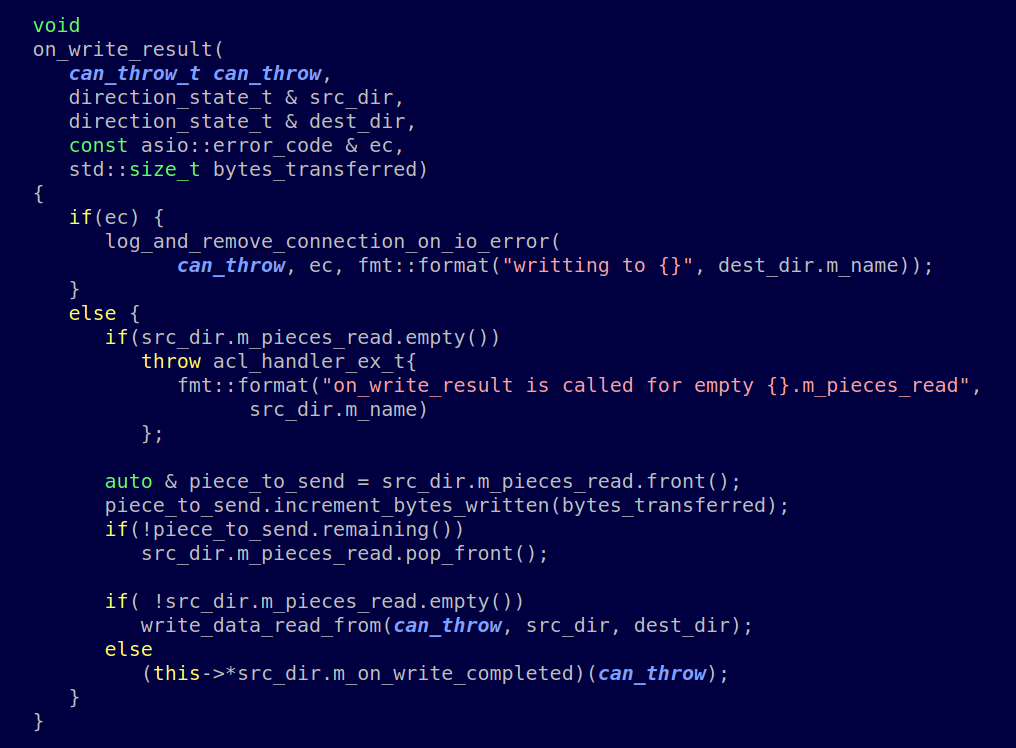
Exceptions are part of the C ++ language. An ambiguous part of it. Someone does not use them in principle. He doesn't use it at all. From the word at all. But not us. Since we consider them to be a very useful thing, significantly increasing the reliability of the code.
Unfortunately, not all exceptions can be used everywhere. Firstly, exceptions are not free and, secondly, not every code is able to "survive" the occurrence of exceptions.
. , C++. , , C++ .
, noexcept. , , .
, C++, , .
C++ noexcept. noexcept / , / . , noexcept / , ( , swap, C- callback- ..).
, noexcept /. , - /, , . , :
void some_handler::on_read_result(
const asio::error_code & ec,
std::size_t bytes_transferred)
{
if(!ec)
{
m_data_size = bytes_transferred;
handle_data();
}
else
{...}
} handle_data , .
noexcept : / .
— , , . C++ - noexcept-. noexcept-. - :
void some_handler::on_read_result(
const asio::error_code & ec,
std::size_t bytes_transferred)
{
noexcept
{
if(!ec)
{
m_data_size = bytes_transferred;
handle_data();
}
else
{...}
}
}. noexcept- noexcept-, . - , , .
, noexcept- C++ . , . . , .
, C++ , , . (callback-).
callback-, completion-handler- Asio. callback- , .. Asio . , completion-handler- — .
callback-, . , , .
callback-, Asio C- , try/catch, , :
void some_handler::on_read_result(
const asio::error_code & ec,
std::size_t bytes_transferred)
{
try
{
handle_read_result(ec, bytes_transferred); // .
}
catch(...)
{
// "" .
}
} , , , ( ) callback try/catch handle_read_result. .
, , . .. , / , .
can_throw
can_throw, /. , can_throw, . /, can_throw.
, - callback- /, can_throw, .
, .. can_throw /. .. :
void some_handler::handle_read_result(
can_throw_t can_throw,
const asio::error_code & ec,
std::size_t bytes_transferred)
{
... // .
}
void some_handler::on_read_result(
const asio::error_code & ec,
std::size_t bytes_transferred)
{
// !
handle_read_result(can_throw_t{}, ec, bytes_transferred);
}, can_throw :
class can_throw_t
{
friend class exception_handling_context_t;
can_throw_t() noexcept = default;
public:
~can_throw_t() noexcept = default;
can_throw_t( const can_throw_t & ) noexcept = default;
can_throw_t( can_throw_t && ) noexcept = default;
can_throw_t &
operator=( const can_throw_t & ) noexcept = default;
can_throw_t &
operator=( can_throw_t && ) noexcept = default;
};.. can_throw_t, " " (). , can_throw_t exception_handling_context_t:
class exception_handling_context_t
{
public:
can_throw_t
make_can_throw_marker() const noexcept { return {}; }
}; make_can_throw_marker()
void some_handler::on_read_result(
const asio::error_code & ec,
std::size_t bytes_transferred)
{
try
{
exception_handling_context_t ctx;
handle_read_result(ctx.make_can_throw_marker(), ec, bytes_transferred);
}
catch(...)
{}
}, exception_handling_context_t try/catch. . , wrap_throwing_action, , try, . - :
class can_throw_t
{
// can_throw
// wrap_throwing_action.
template<typename Lambda>
friend void wrap_throwing_action(Lambda &&);
can_throw_t() noexcept = default;
public:
... // .
};
template< typename Lambda >
void wrap_throwing_action(Lambda && lambda)
{
try
{
lambda(can_throw_t{});
}
catch(...)
{}
}.
can_throw_t exception_handling_context_t.
, callback- , , try.
, - / callback-, . , try . exception_handling_context_t :
some_handler::some_handler(
std::vector<std::byte> initial_data,
std::size_t initial_data_size)
: m_data{std::move(initial_data)}
, m_data_size{initial_data_size}
{
exception_handling_context_t ctx;
handle_data(ctx.make_can_throw_marker());
}
...
void some_handler::handle_read_result(
can_throw_t can_throw,
const asio::error_code & ec,
std::size_t bytes_transferred)
{
if(!ec)
{
m_data_size = bytes_transferred;
handle_data(can_throw);
}
else
{
...
}
}
...
void some_handler::handle_data(can_throw_t)
{
... // .
} , catch: - , - "" ( callback- , ). wrap_throwing_action wrap_throwing_action.
" " . . : , . /, , , /.
, , - .
-, can_throw. .., , , . , , / . , , , .
-, can_throw . , , . .. callback-, can_throw , . can_throw callback- — callback- ( , callback-).
can_throw , can_throw . , can_throw . , , — .
, , , can_throw .
, , C++.
. , - ( RSDN) 15 . , , - .
, ++. can_throw. , :( .